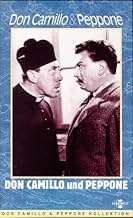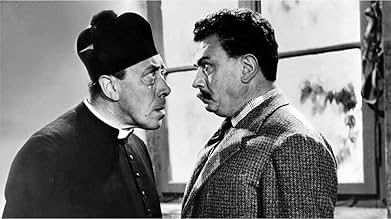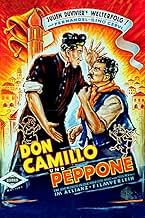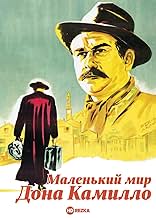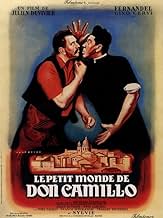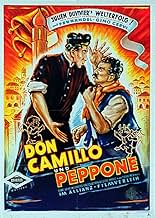VALUTAZIONE IMDb
7,6/10
4961
LA TUA VALUTAZIONE
Un prete determinato e un sindaco comunista sviluppano un'amicizia riluttante nonostante la loro rivalità ufficiale.Un prete determinato e un sindaco comunista sviluppano un'amicizia riluttante nonostante la loro rivalità ufficiale.Un prete determinato e un sindaco comunista sviluppano un'amicizia riluttante nonostante la loro rivalità ufficiale.
- Nominato ai 1 BAFTA Award
- 3 vittorie e 4 candidature totali
Vera Talchi
- Gina Filotti
- (as Vera Talqui)
Charles Vissières
- Il Vescovo
- (as Charles Vissiere)
Clara Auteri Pepe
- Woman saying 'Viva Peppone!'
- (as Clara Auteri)
Manuel Gary
- Il delegato
- (as Manoel Gary)
Trama
Lo sapevi?
- QuizThe whole film was shot twice; there is a French and an Italien negative, that can be distinguished by details in editing and content (watch the position of the dog during the procession for example).
- Citazioni
Crocefisso: Where did you get that cigar, Camillo?
Don Camillo: Peppone had two. I think I took it without asking him. You know he believes in equal distribution of wealth.
- Versioni alternativeGerman version runs 2 minutes shorter than the Italian original version.
- ConnessioniFeatured in Cinema forever - Capolavori salvati (2001)
Recensione in evidenza
I have recently watched so many American gangster and noir films that I felt I needed something different for a change. What better than a French-Italian co-production from the immediate post-war period? It got to be 'The Little World of Don Camillo'. Fernandel plays the eponymous priest of a small town in Northern Italy who is the friend and enemy of the newly elected communist mayor 'Peppone' Bottazzi (Gino Cervi with a moustache that makes him look like Stalin). The film, set in 1946, concerns Camillo and Peppone's friendly quarrels about how best to serve their little town (the 'little world' of the title): they want the same things but differ about the best ways to get them. Director Julien Duvivier has adapted episodes from Guareschi's novel and cleverly intervove them so that they make up a charming and amusing whole: a film that's heartwarming and funny, though there are no moments when you laugh out loud. Fernandel is outstanding and Cervi does very well as his frenemy. The picture is interesting non the least because it offers a glimpse of life in post-war Italy and an insight into the political and social atmosphere of the time. Highly recommended!
- Philipp_Flersheim
- 17 mar 2022
- Permalink
I più visti
Accedi per valutare e creare un elenco di titoli salvati per ottenere consigli personalizzati
- How long is The Little World of Don Camillo?Powered by Alexa
Dettagli
- Data di uscita
- Paesi di origine
- Lingue
- Celebre anche come
- The Little World of Don Camillo
- Luoghi delle riprese
- Aziende produttrici
- Vedi altri crediti dell’azienda su IMDbPro
- Tempo di esecuzione1 ora 36 minuti
- Colore
- Proporzioni
- 1.37 : 1
Contribuisci a questa pagina
Suggerisci una modifica o aggiungi i contenuti mancanti

Divario superiore
By what name was Don Camillo (1952) officially released in India in English?
Rispondi
